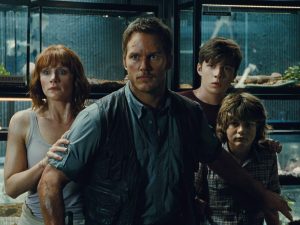By Stephanie Menders | Staff Writer
Mad Max: Fury Road premiered in theaters in early May, introducing a new perspective on a popular 80s franchise. Charlize Theron plays Furiosa, an empowering character who carried just as much of the movie as Max himself. Furiosa has everything that a generation of feminists had been praying for from Hollywood. She is a complicated hero ridden with internal conflicts, bursting with strength, and a quest for redemption- easily one of the most dimensional characters in contemporary cinema. This is the glory of film reboots. As nerve-wracking as the trend of reboots can be, it gives us a chance to revisit films with the opportunity to update those annoying little cringe worthy tidbits to align with our growing ideologies. But if there’s one thing history has proven about cultural progress, it’s that one step forward always leads to two steps back. So before there was even time for Fury Road‘s star to fade it was time to cue the dinosaurs.
Those two steps back were taken by Colin Treverrow’s blockbuster Jurassic World, a reboot film overflowing with awkward action movie punch lines, macho attitude, and superfluous subplots- all at the expense of the film’s women. Let’s talk about this in terms that the average Jurassic fan might appreciate. Imagine Jurassic World evolved from its ancestor Jurassic Park. The genome of the film had been fossilized in amber, preserved for the last two decades, and then Treverrow and his team of writers smashed that fossilized amber into a million pieces.
In 1993, Jurassic Park, director Steven Spielberg gave us three scientists, each an expert in their respective field. Dr. Ellie Sattler (Laura Dern) is one of those three experts, specializing in paleobotony. The movie never undermines her research or her methods. In fact, where Ian Malcolm (Jeff Goldblum) imparts his knowledge by flirtatiously playing with water droplets on the back of her hand, she’s elbow deep in dino excrement.

Now here’s where Treverrow smashed that fossil. Jurassic World gives us Claire Dearing (Bryce Dallas Howard) and repeatedly shows us that she’s really bad at being a woman. As the park’s operations manager she is responsible for overseeing a control room of sarcastic subordinates, fear inducing attractions and damage control. In the middle of the park’s busiest week after the premiere of a new attraction, Claire’s sister requests that she show her two nephews around the park. Claire is expected to put her work week on hold to babysit the young brothers, but transforms into a villain when she hands them off to her blackberry wielding assistant, yet another working woman who’s lacking in maternal instinct. The assistant quickly loses the boys, and as a result of her neglectful behavior she is eaten by a pterodactyl, and that pterodactyl is eaten by a giant water dinosaur.
Jurassic World is obsessed with belittling Claire on every front. Her boss tells her that she’s too uptight and needs to relax while he erratically pilots a helicopter and she hangs on for dear life. There is no evidence that Claire’s work ethic is troublesome to her career. Men in films (or reality) are rarely told to loosen up; irrationality is a characteristic reserved for demeaning women. In my dream fan-edit version of Jurassic World, Claire would be reporting her boss to her human resources representative.
The film wastes no time belittling Claire’s status to mandatory love-interest opposite the park’s velociraptor trainer Owen (Chris Pratt). Owen explains, “I don’t control the raptors, it’s based on mutual respect. That’s why you and I never had a second date.” Jurassic World becomes obsessed with getting the career girl to loosen up so she can be attractive to the macho man. By the time the film closes with their kiss we almost completely forget that there was ever any chance of romance between them. Like a lot of moments in the film, it feels tacked on.
After Claire’s two nephews go missing, she and Owen set out to find them. Before entering into the jungle, Owen mocks Claire’s high heels but she refuses to take them off. Even in the face of danger, Claire is forced to maintain her feminine appearance as opposed to trading in her high heels for a practical pair of cross-trainers.
After Claire and Owen reunite with the boys, Claire saves the three of them by shooting down a pterodactyl. They load into their jeep, and Owen floors it in reverse to avoid a stampede. The boys cry out, “Can we stay with you?” and when Claire reassures their safety with her, they respond, “We meant him.” After the audience’s soft chuckle quickly silences, you can’t help but wonder if Chris Pratt’s driving skills were that much more impressive than the shock of their aunt blasting a pterodactyl.
What’s so depressing about Jurassic World is the lack of support for Claire. Her subordinates, her counterparts, and her boss constantly undermine her. Her relationship with her sister is especially disheartening. After explaining to her sister (Judy Greer) how she doesn’t have time to watch the children, her sister responds, “It’s not a matter of if you have kids, it’s a matter of when.” At this point I threw in the towel.
No one ever told Furiosa to relax, or questioned her about when she was finally going to start a family. Furiosa wasn’t forced to babysit her nephews while driving a war rig across a post-apocalyptic desert. In reality, women are still facing sexual harassment in the workplace. Women are still making 80 cents to a man’s dollar. Women are still fighting for their reproductive rights. If by 2015 we’re not having leading ladies, give us hope by creating respected female sidekicks. I would have rather seen Jurassic World without women than Jurassic World with women being disrespected. A movie like Fury Road premieres and we hope that we have arrived, but here creeps Jurassic World, lurking in the shadows, waiting to pounce, so we can take those two steps back.














